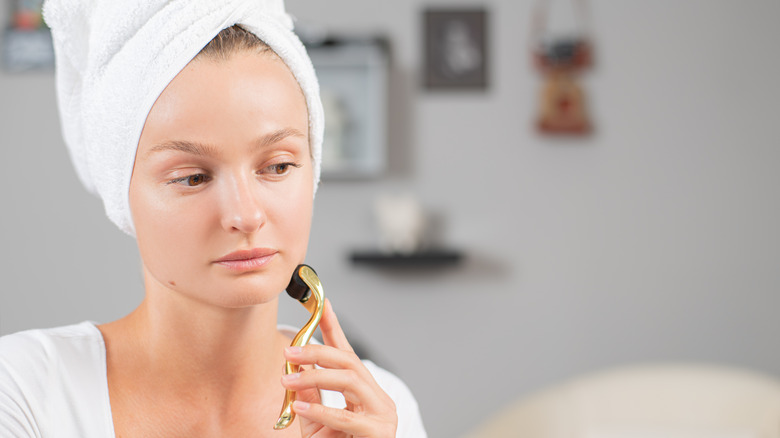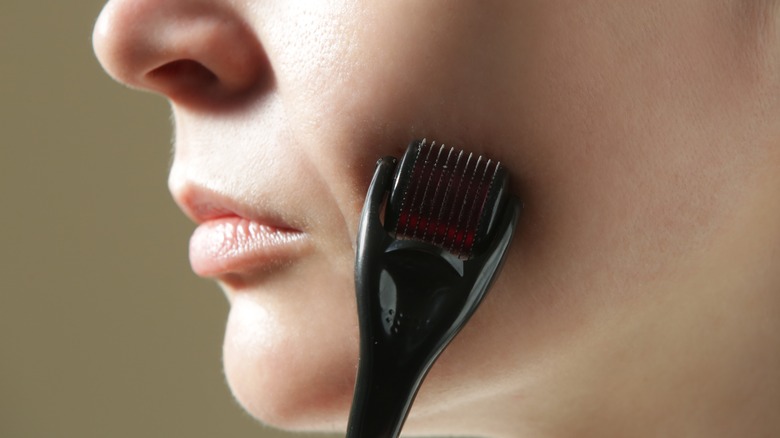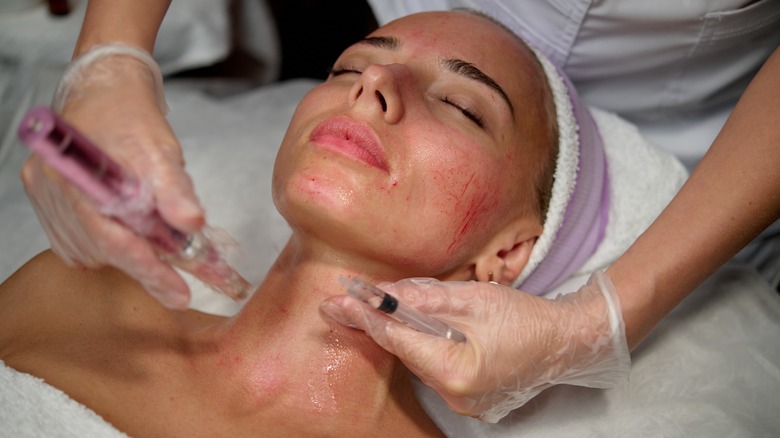Why You May Want To Reconsider Using A Derma Roller On Your Skin At Home
Technology has advanced far enough that we can now bring a little piece of the dermatologist's office straight into our homes. There is a growing number of skin care devices in the market that promise to deliver the same results as the machines your derms use, allowing people to make fewer doctor's appointments, save more money, and devote more time to DIY-ing.
Case in point: There are LED masks developed to banish wrinkles, reduce inflammation, and tighten the skin up, while there are so-called face wands that can supposedly deliver an at-home facial. Less techy options are also available, like beauty rollers and gua shas that can help you perform facial massages, and then there are controversial ones like the derma rollers, which are designed to make the popular microneedling treatment more accessible. Derma rollers are technically portable microneedling instruments, which board-certified cosmetic dermatologist Dr. Shereene Idriss as "a handheld drum-shaped device studded with needles that can range in length up to 0.25mm." She told Editorialist that when you roll the device across the face, it creates "micro-channels (aka tiny punctures) that allow for more enhanced product penetration."
Sounds scary, no? It's because it is. Creating holes in your skin, no matter how minuscule, can potentially lead to a disaster. But Dr. Idriss notes that "when performed correctly," it can "theoretically help to minimize fine lines, acne scars, stretch marks, and even help fade hyperpigmentation." But can you really risk it?
Dermarolling can leave microtears on your skin
While many tout the benefits of derma rolling, with a popular TikToker claiming that it helped with their hyperpigmentation, it may do more harm than good. There's a reason why microneedling is originally done by a professional in the first place. Lisa Montlake, an advanced aesthetician and cofounder of Fern Skin Clinic, told Refinery29 that performing the procedure at home can only worsen your skin issues or even create new ones. "Not only can you create bruising and track-mark lines from using too much pressure, but the wrong technique can easily cause micro-tears in the skin, leading to scarring and hyperpigmentation," she said. You know how you swore you'll never use the St. Ives Apricot Scrub again for this very reason? Exactly.
What's more, even though there are one too many derma roller options available, their efficacy is not guaranteed, and you may end up with a dud that can ruin your overall complexion. "The rolling needles can easily break and leave small broken fragments in the skin," Dr. Anna Avaliani, a cosmetic and laser skin care specialist, explained to Women's Health. "Additionally, skin and needles must be very well-cleaned to avoid any kind of infection. I don't believe at-home microneedling is safe or effective at all."
And besides, despite all the positive anecdotes about derma rolling, it may not be that effective anyway since derma rollers are only miniature versions of professional microneedling contraptions. If it benefits your skin at all, it would be to an insignificant degree. "Most home derma rollers are limited in their length and, therefore, not very effective at improving fine lines, wrinkles, and acne scars," Dr. Jenny Liu, a board-certified dermatologist, shared with The Cut.
Trust the pros instead
There is no discounting the positive effects of microneedling, but it's best to let the professionals handle the procedure instead of tinkering with a puncture-generating device at home. As Dr. Brian Hibler pointed out to Harper's Bazaar, pros are trained to carry out the procedure safely and know how to tailor it based on your skin's unique needs. "I think microneedling is safest to be performed in the medical setting with equipment that has been thoroughly researched and tested and with devices capable of reaching deeper depths for greater improvement," he said. "In-office devices can be adjusted to the depth necessary to treat your individual concerns safely and effectively."
And it's not like there aren't any alternatives out there that you can safely try at home. There is a smattering of topicals and ingredients you can introduce to your routine that can also help with a slate of skin concerns, like peptides for accelerating collagen production and minimizing the signs of aging, retinoids for facilitating skin cell turnover, and ectoin for improving your skin's texture. The best part of resorting to these alternatives? They won't create holes in your skin at all.


